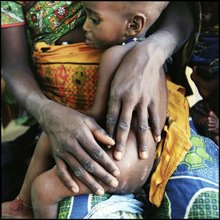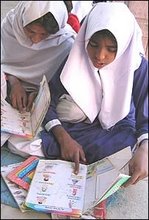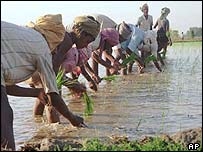PREAMBLE: In September 2000, the Millennium Declaration set 2015 as the target date for achieving most of the Millennium Development Goals (MDGs), which established quantitative benchmarks to halve extreme poverty in all its forms. More than halfway to this target date, major advances in the fight against poverty and hunger have begun to slow or even reverse as a result of the global economic and food crises, a UN progress report has found. The assessment, launched by UN Secretary-General Ban Ki-moon, warns that, despite successes, overall progress has been too slow for most of the targets to be met by 2015. Progress towards the goals is now threatened by sluggish or even negative economic growth, diminished resources, fewer trade opportunities for the developing countries, and reductions in aid flows from donor nations.
Background: In September 2000, leaders of 189 countries met at the United Nations (UN) in New York and endorsed the Millennium Declaration, a commitment to work together to build a safer, more prosperous and equitable world. The Declaration was translated into a roadmap setting out eight time-bound and measurable goals to be reached by 2015, known as the Millennium Development Goals (MDGs):
1. Eradicate extreme poverty and hunger
Reduce by half the proportion of people whose income is less than $1 a day
Achieve full and productive employment and decent work for all, including women and young people
Reduce by half the proportion of people who suffer from hunger
2. Achieve universal primary education
Ensure that all boys and girls complete a full course of primary schooling »»
3. Promote gender equality and empower women
Eliminate gender disparity in primary and secondary education preferably by 2005, and in all levels of education no later than 2015
4. Reduce child mortality
Reduce by two thirds the mortality of children under five »»
5. Improve maternal health Reduce maternal mortality by three quarters
Achieve universal access to reproductive health
6. Combat HIV/AIDS, malaria and other diseases
Halt and reverse the spread of HIV/AIDS
Achieve, by 2010, universal access to treatment for HIV/AIDS for all those who need it
Halt and reverse the incidence of malaria and other major diseases
7. Ensure environmental sustainability
Integrate principles of sustainable development into country policies and programmes; reverse the loss of environmental resources
Reduce biodiversity loss, achieving, by 2010, a significant reduction in the rate of loss
Halve the proportion of people without access to safe drinking water and basic sanitation
Improve the lives of at least 100 million slum dwellers by 2020
8. Develop a global partnership for development
Develop further an open, rule-based, predictable, non-discriminatory trading and financial system
Address special needs of the least developed countries, landlocked countries and small island developing States
Deal comprehensively with developing countries’ debt
In cooperation with pharmaceutical companies, provide access to affordable essential drugs in developing countries
In cooperation with the private sector, make available the benefits of new technologies, especially information and communications technologies
OVERVIEW – Extracts Paraphrased from the Report
The grim repercussions of the economic crisis
Although data are not yet available to reveal the full impact of the recent economic downturn, they point to areas where progress towards the 8 goals has slowed or reversed. Major advances in the fight against extreme poverty from 1990 to 2005, for example, are likely to have stalled. During that period, the number of people living on less than $1.25 a day decreased from 1.8 billion to 1.4 billion. In 2009, an estimated 55 million to 90 million more people will be living in extreme poverty than anticipated before the crisis.
The encouraging trend in the eradication of hunger since the early 1990s was reversed in 2008, largely due to higher food prices. The prevalence of hunger in the developing regions is now rising, from 16% in 2006 to 17% in 2008. A decrease in international food prices in the second half of 2008 failed to translate into more affordable food for most people around the world. Not surprisingly, children bear the brunt of the burden. More than a quarter of children in developing regions are underweight for age, stunting their prospects for survival, growth and long term development. Meagre progress on child nutrition from 1990 to 2007 is insufficient to meet the 2015 target, and will likely be eroded by higher food prices and economic turmoil.
These ongoing crises may also hold back progress towards gender equality, by creating new hurdles to women’s employment. The International Labour Organization estimates that global unemployment in 2009 could reach 6.1 to 7.0% for men and 6.5 to 7.4% for women, many of whom remain trapped in insecure — often unpaid — jobs.
Other fallout from the global financial situation may be compromised funding for programmes to improve maternal health, the goal towards which there has been least progress so far. Since the mid-1990s, most developing countries have experienced a major reduction in donor funding for family planning on a per woman basis, despite the undeniable contribution of such programmes to maternal and child health.
The ability of countries to mobilize domestic resources for development is in jeopardy. Export revenues of developing countries fell in the last quarter of 2008, with the collapse of commodity prices and exports more generally. Debt service to exports ratios of developing countries are likely to deteriorate further, especially for those countries that enjoyed increased export revenues for the last several years. Economic necessity will continue to exert pressure on a fragile global environment, where deforestation and the species extinction proceed at alarming rates, and a global water crisis looms.
At the Gleneagles summit of the Group of Eight in 2005, and at the UN World Summit later that year, donors committed to increasing their aid. With most OECD economies in recession, even fulfillment of those commitments, which were expressed as a percentage of donors’ national income, would imply a diminished amount of aid. For many developing countries, lower levels of aid would not only impede further progress, but could reverse some of the gains already made.
Successes so far
The report also portrays the remarkable advances that many countries and regions had made before the economic landscape changed so radically in 2008:
• Those living in extreme poverty in the developing regions accounted for slightly more than a quarter of the developing world’s population in 2005, compared to almost half in 1990.
• Major accomplishments were also made in education. In the developing world as a whole, enrolment in primary education reached 88% in 2007, up from 83% in 2000. And most of the progress was in regions lagging the furthest behind. In sub-Saharan Africa and South Asia, enrolment increased by 15% and 11% respectively from 2000 to 2007.
• Deaths of children under five declined steadily worldwide — to around 9 million in 2007, down from 12.6 million in 1990, despite population growth. Although child mortality rates remain highest in sub-Saharan Africa, recent survey data show remarkable improvements in key interventions that could yield major breakthroughs for children in that region in the years ahead. Among these interventions are the distribution of insecticide-treated bed nets to reduce the toll of malaria; as a result of immunization, dramatic progress is also being made in the fight against measles.
• At the global level, the world came together to achieve a 97% reduction in the consumption of substances that deplete the Earth’s protective ozone layer, setting a new
precedent for international cooperation.
Where accelerated progress is needed
• Efforts to provide productive and decent employment for all, including women and young people, must be revitalized. The share of women in paid employment outside the agricultural sector has increased only marginally over the years. And in South Asia, North Africa and West Asia, employment opportunities for women remain extremely low.
• The war against hunger must be embraced with renewed vigour, especially in the interests of our youngest citizens. In the countries hardest hit by the recent rise in food prices, we must implement measures to increase the availability of food, and strengthen social policies that address the negative impact on the poor.
• Work must be intensified to get all children into school, especially those living in rural communities, and eliminate inequalities in education based on gender and ethnicity, and among linguistic and religious minorities. The target of eliminating gender disparities in primary and secondary education by 2005 has already been missed.
• Greater political will must be mustered to reduce maternal mortality, especially in sub-Saharan Africa and South Asia, where negligible progress has been made so far.
• Rapid acceleration of progress is needed to bring improved sanitation to the 1.4 billion people who were doing without in 2006, with all its attendant consequences for the health of communities and the local environment. At the present rate of progress, the 2015 sanitation target will be missed.
• Efforts to improve the living conditions of the urban poor must pick up speed and extend even further. Although every region except one has made progress in this area,
slum improvements are barely keeping pace with the rapid growth of developing country cities.
• Last, but by no means least, greater priority must be given to preserving our natural resource base… We have not acted forcefully enough — or in a unified way — to combat climate change; our fisheries are imperiled; our forests, especially old-growth forests, are receding; and water scarcity has become a reality in a number of arid regions.
Learning from past experience, and looking ahead
Advances are most evident where targeted interventions have had an immediate effect, and where increased funding has translated into an expansion of programmes to deliver services and tools directly to those in need. In contrast, progress has been more modest when it requires structural changes and strong political commitment to guarantee sufficient and sustained funding over a longer period of time. This is likely the reason behind the poor performance of most countries in reducing maternal mortality and increasing access of the rural poor to improved sanitation facilities.
Achieving the MDGs will require that the development agenda be fully integrated into efforts to jumpstart growth and rebuild the global economy. At the top of the agenda is the climate change problem, which will have to be regarded as an opportunity to develop more efficient ‘green’ technologies and make the structural changes needed that will contribute to sustainable growth. Achieving the MDGs will also require targeting areas and population groups that have clearly been left behind — rural communities, the poorest households and ethnic minorities, all of whom will have a hand in shaping our common future.
Note: This overview is attributed to Sha Zukang, UN Under-Secretary-General for Economic and Social Affairs. The selection of extracts and paraphrasing from this overview for the purposes of this blog is by PacificSci, in the global public interest.
Source: The Millennium Development Goals Report 2009. http://www.un.org/millenniumgoals/pdf/MDG%20Report%202009%20ENG.pdf
FROM a Great Canadian and World Statesman
"A great gulf... has... opened between man's material advance and his social and moral progress, a gulf in which he may one day be lost if it is not closed or narrowed..."
Lester B Pearson
http://nobelprize.org/nobel_prizes/peace/laureates/1957/pearson-lecture.html
Tuesday, 15 September 2009
Subscribe to:
Comments (Atom)
INSPIRATIONAL WELCOME ............................... from T.S.Eliot's "Little Gidding"
If you came this way From the place you would come from... It would be the same at the end of the journey...
If you came, not knowing what you came for, It would be the same... And what you thought you came for Is only a shell, a husk of meaning... From which the purpose breaks only when it is fulfilled If at all.


























